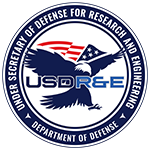Department of Defense Laboratories
The research institutes at UTSA are cross-disciplinary collaborations within the University that sponsor research that informs public policy, builds cultural understanding, improves medical care, enhances scientific knowledge, and often advances economic development.
There are 32 research centers and institutes at UTSA which are governed by the Deans Research Council (DRC). Visit their websites for more information about the work of these UTSA Research Centers & Institutes, National Laboratories, and Department of Defense laboratories.
The U.S. Army Research Laboratory’s Army Research Office (ARO) mission is to serve as the Army’s premier extramural basic research agency in the engineering, physical, information and life sciences; developing and exploiting innovative advances to insure the Nation’s technological superiority. The ARO research program consists principally of extramural academic research efforts consisting of single investigator efforts, university-affiliated research centers, and specially tailored outreach programs..
AFOSR continues to expand the horizon of scientific knowledge through its leadership and management of the Air Force’s basic research program. As a vital component of the Air Force Research Laboratory (AFRL), AFOSR’s mission is to support Air Force goals of control and maximum utilization of air, space, and cyberspace.
Creating breakthrough technologies for national security is the mission of the Defense Advanced Research Projects Agency (DARPA). By making pivotal investments in new technology-driven ideas for the United States, DARPA imagines and makes possible new capabilities for overcoming the multifaceted threats and challenges that lie ahead. This makes a better, more secure future possible. In an uncertain world, with constrained budgets, providing these new capabilities is more important than ever. DARPA has helped build a future where we can fully control the electromagnetic spectrum for communications, sensing, and imaging.
DTRA is the U.S. Department of Defense’s official Combat Support Agency for countering weapons of mass destruction. Our people are Subject Matter Experts on WMD, and we address the entire spectrum of chemical, biological, radiological, nuclear and high yield explosive threats. DTRA’s programs include basic science research and development, operational support to U.S. warfighters on the front line, and an in-house WMD think tank that aims to anticipate and mitigate future threats long before they have a chance to harm the United States and our allies.
The Ames Laboratory is a government-owned, contractor-operated national laboratory of the U.S. Department of Energy (DOE), operated by and located on the campus of Iowa State University in Ames, Iowa. The Ames Laboratory leads the Critical Materials Institute where researchers develop solutions to domestic shortages of rare-earth materials and other materials critical to U.S. energy security.
The DMRDP is focused on advancing the state of medical science in areas of the most pressing needs. The current emphasis is on post-traumatic stress disorder (PTSD), traumatic brain injury (TBI), prosthetics, restoration of eye sight and advancing eye care, and other conditions directly relevant to battlefield injuries and other ailments that affect both Service members and their families.
The office of the Congressionally Directed Medical Research Programs (CDMRP) manages Congressional Special Interest Medical Research Programs (CSI) encompassing breast, prostate, and ovarian cancers, neurofibromatosis, military health, and other specified areas. Since fiscal year 1992, the CDMRP has managed approximately over $7.5 billion in Congressional appropriations for peer-reviewed research aimed to prevent, control, and cure disease. Through fiscal year 2012, approximately 11,802 awards have been made to advance health care solutions via extramural grants, contracts, and cooperative agreements.
The Assistant Secretary of Defense for Research and Engineering (ASD(R&E)) provides S&T leadership throughout the Department of Defense; shaping strategic direction and strengthening the research and engineering coordination efforts to meet tomorrow’s challenges.
As an executive branch agency within the Department of Defense, the Office of Naval Research (ONR) supports the President’s budget. ONR provides technical advice to the Chief of Naval Operations and the Secretary of the Navy. The 2011 Naval Science and Technology Strategic Plan describes ONR’s investments in 13 technology focus areas that will enable the future operational concepts of the U.S. Navy and Marine Corps. Additionally, ONR supports technologies for the U.S. Marine Corps.








